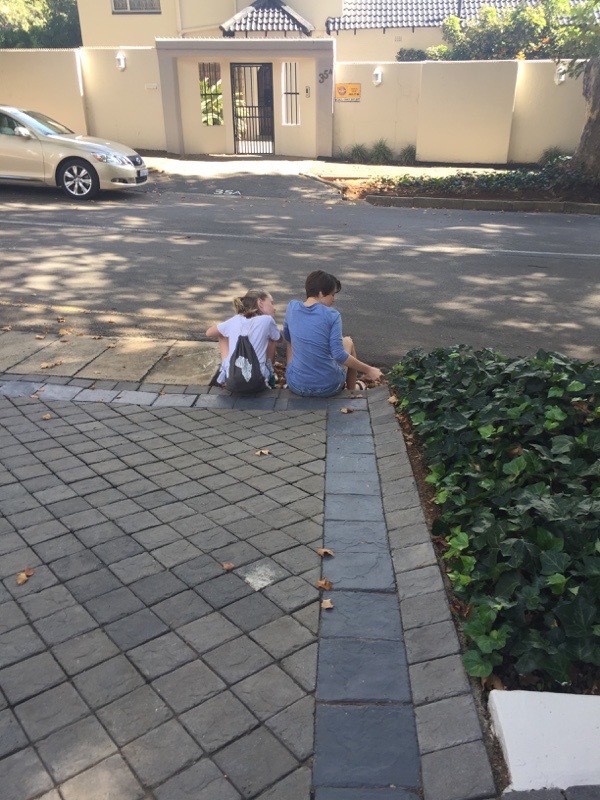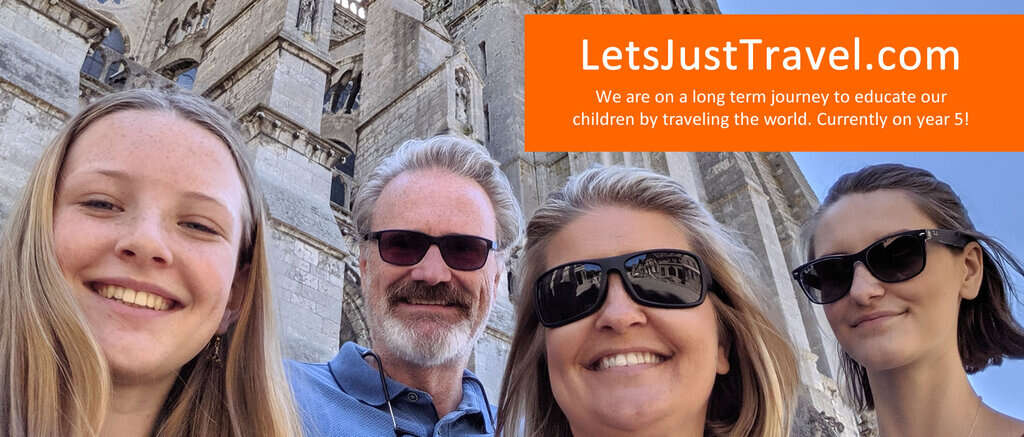We lived in Johannesburg for 28 days. You can read about our experience at our Airbnb here, our first impressions and our favorite part: all the wonderful people. But we also learned a lot about the city itself and I wanted to share some of our learnings and opinions, in hopes of helping others who may be thinking of coming to South Africa or those interested in learning about it. Let us just say right up front: these are the things we’ve learned from living here a short time, based on a lot of conversations with Uber drivers, business owners and people who have lived here their whole lives. It is our interpretation of this area which may or may not agree with yours or other people who live here. So take what you want from this, but we found it fascinating and we want to tell you about it.
Concrete Jungle
JB residents describe their city as a concrete jungle and they would be right. Despite having some of the best weather in the world, there are not a lot of outdoor spaces in JB where people feel comfortable just hanging out. A car (or Uber, as we did) to get around is critical. There are places one can go to enjoy the outdoors, but they tend to be destinations, not just parks or plazas that you can stumble upon and relax in. Puebla, Mexico and the Costa del Sol in Spain could definitely teach JB a thing or two about having wonderful outdoor spaces.
But Oh! The Trees!
You can’t be here 24 hours without someone telling you about JB being the world’s largest urban forest. When the gold rush hit Johannesburg in 1886 the land was barren of trees and housed only a few animals grazing on the grass. The discovery of gold led to a need for timber for the mine supports, so some enterprising businessmen planted trees to support the mining. There are so many trees. Almost all neighborhoods have a canopy of tress. It’s very beautiful and quite striking. Although it kind of became an embarrassment of riches. One of the most common trees in Johannesburg is a bit of a water-hog and uses up too much of the water table, so when it comes to the end of it’s life cycle in 50 years, they will not be replanting that kind.
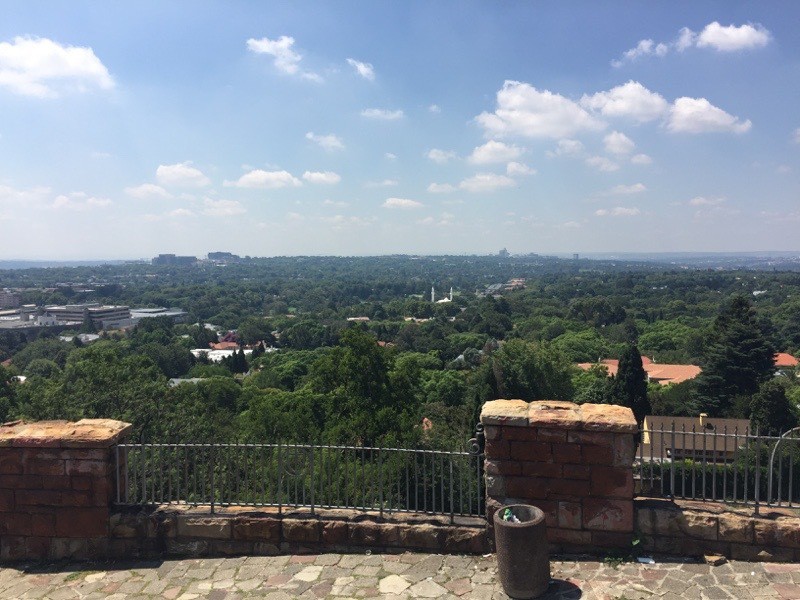
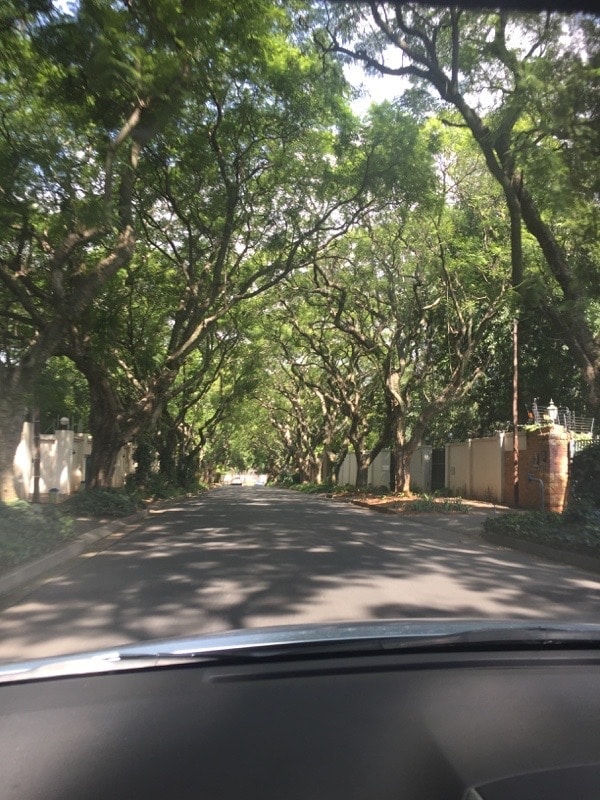
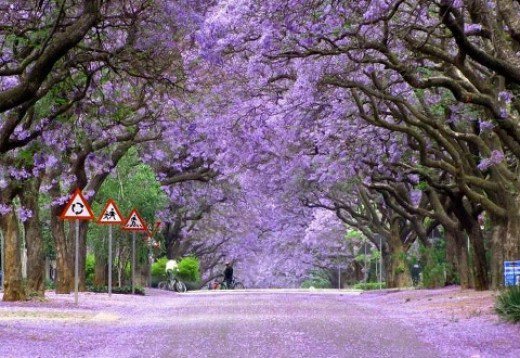
Business Environment
South Africa has a very bad unemployment problem and their infrastructure is crumbling due to poor planning by the new government 20+ years ago (who weren’t used to leading a nation, of course). And their laws are skewed towards racial reparations instead of economic solvency. Meaning, any business that hires people has racial quotas they MUST adhere to. If you have 10 employees, 8 of them MUST be black, 1 MUST be colored (mixed race or Indian) and 1 can be white. As you can imagine, this can artificially boost the fortunes of people of color but at the expense of businesses being able to operate with the right talent for the right job. Which inevitably has a negative overall economic domino effect of sorts. When you are prevented from utilizing talents for maximum output and efficiency, it’s going to show. And it does. This hurts everyone in the nation, not just the minority whites (which, let’s face it, the current laws are designed to do). They also have a huge problem with crime. Although it isn’t as prevalent as the media reports would have you believe, it is still a bigger problem than any law-abiding person would hope to live around. Evidenced by every house in Johannesburg looking as fortified as Fort Knox from the outside. There are also growing reports of farms in rural South Africa who are being forcibly taken over and farmers murdered. A recent report cited 11 farmers murdered in the last 14 days. Evidently there’s a growing movement of re-claiming farms that residents feel were taken unfairly from them when settlers from Europe arrived in the 1800s. Like I said…. it’s complicated.
Commodity pricing isn’t as high as it once was which doesn’t help the economic situation. And South Africa is commodity-rich. They are the world’s biggest producer of gold and platinum (they produce 88% of the world’s platinum), the fourth largest producer of diamonds and they say that South Africa has 1/3 of the entire earth’s un-mined gold. But their mining output is only 4.9% of their GDP. So although they do rely on commodities to fuel their economy, it isn’t as big as you think. They need a big dose of free markets, economic freedom and a government that isn’t highly corrupt. Corruption is a HUGE issue here and could fill an entire post.
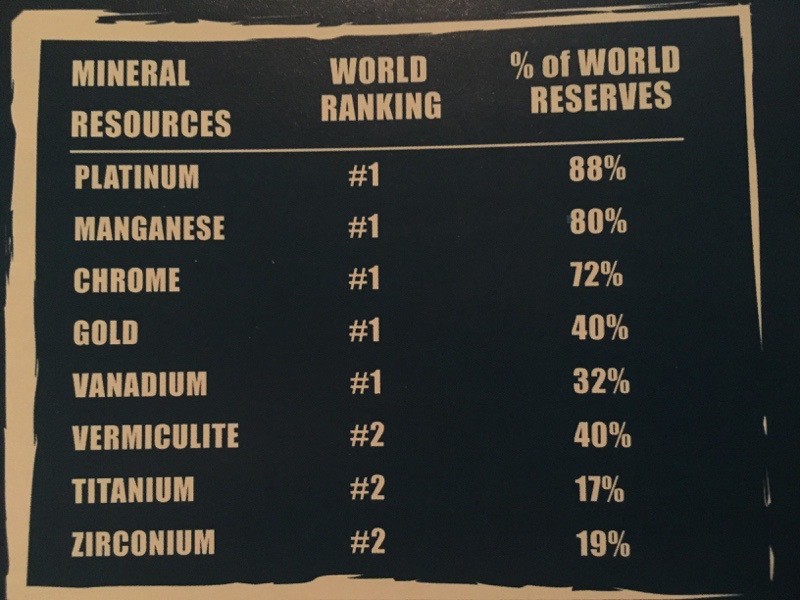
Taxis
We did not take any taxis. We aren’t that adventurous. But the taxis here are more like the buses, or colectivos, that we saw in Mexico. They are mini vans that hold around 15 people. They are not labeled as to where they are going, but there is a well-known system of hand signals that people use when they are looking for the taxi to their area of town. Who needs labels when you have hands?
To get off the taxi you say “After robot”, which means “After the next stop light” and the taxi will come to a sudden stop despite a line of cars behind him. The gov’t is attempting to upgrade many of the taxis that are starting to become unsafe with some sort of incentive program. Dan says: of course, when you say the “government” is doing something that private enterprise should be doing, please refer to corruption comment above… which is why Uber is killing it in the South Africa market much to the dismay of the very powerful taxi cartels… but I digress.
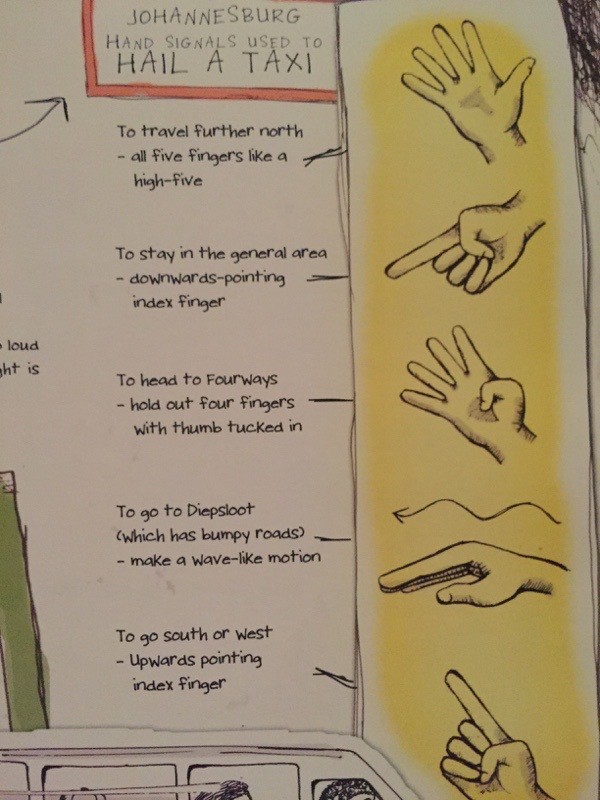

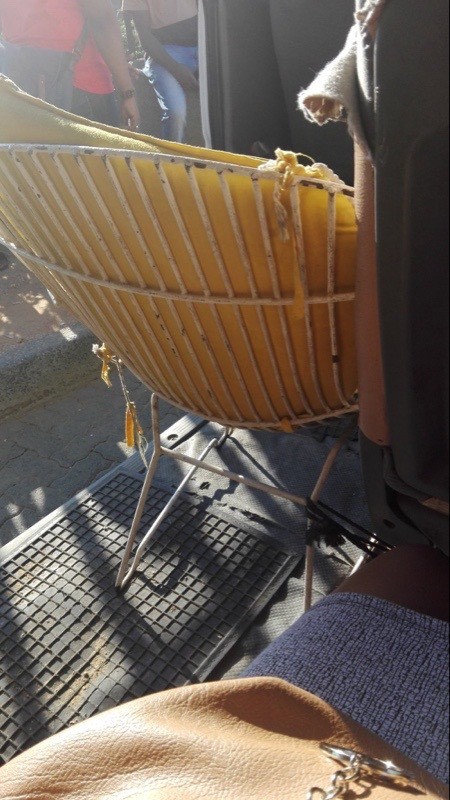
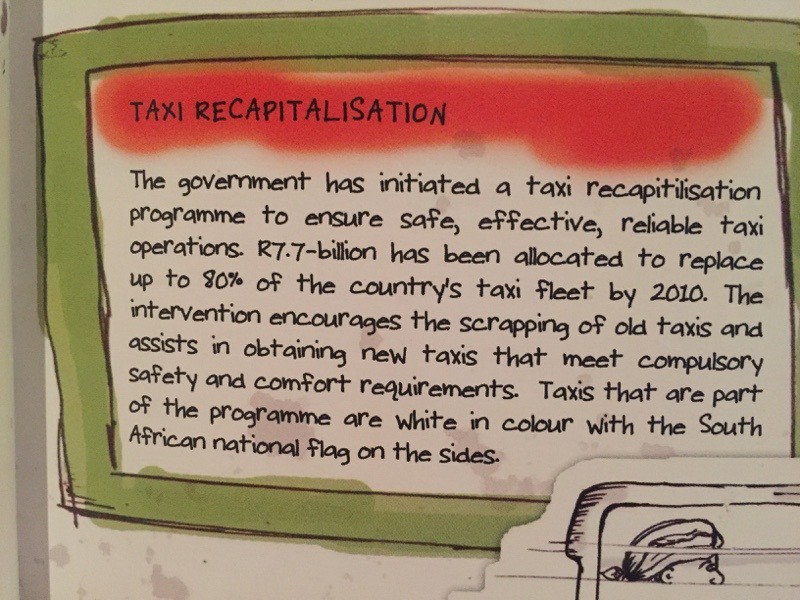
Infrastructure Issues
We did not experience this personally but we are aware of the failing infrastructure in JB (as mentioned above). I signed up for the Twitter feed for the city of JB, and it also recommended I sign up to see the tweets from the Joburg power and water companies. Those were a fascinating glimpses into the challenges this town faces. For one, they have some fantastic social media employees who are kept very busy with constant updates. But the updates were an unfortunate necessity of a failing infrastructure.
As it was described to me, after Apartheid ended in 1994, the emphasis was on providing homes for all the displaced black residents. The government simply added them to the current infrastructure and has not done the proper maintenance to keep it functioning well. Tripped circuits, broken breakers, burst water pipes and constant repairs means that power and water are all things you cannot take for granted. For the first time since Panama I had buckets filled with water at the ready in case the water went out, either by planned outage or because of a problem in the area.
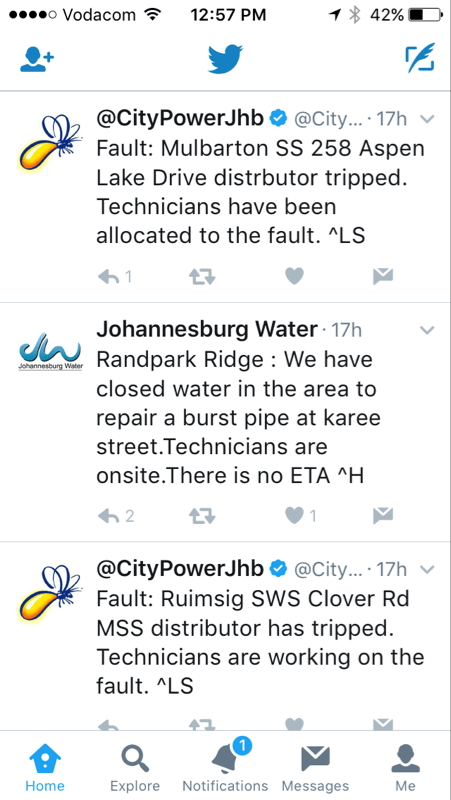
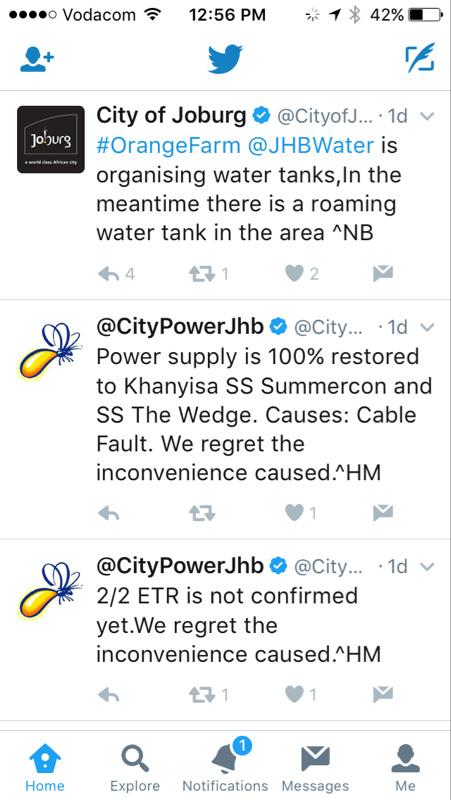
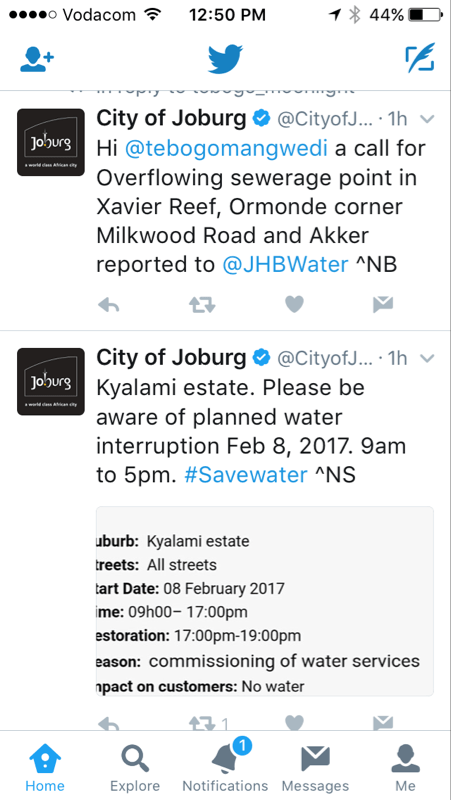
Complex Cultural Issues
South Africa has 11 official languages. It does not have one culture, it has many. And they all identify themselves differently. And one culture in one part of the country could mean something else entirely in another. Some tribes are sworn enemies of each other and refuse to work together. Most people we met held dual passports and most people had an escape plan for where they would go if they felt like they needed to leave the country or JB. You would ask people their heritage and it was never an easy answer: Afrikaans, Zulu, British, Zimbabwean, it was all so varied. When you are seeking unity in so many ways, it makes it very difficult when you do not share the same culture. It’s like walking around the halls of the UN around here. And because of this diversity, it seems like the pride of being African comes slightly ahead of being “South African”: continent THEN country. This may just be our unique perception and not actually true. Others can make that call better than we can, of course. But everywhere you look, from t-shirts to billboards, we see maps of the entire continent of Africa more than maps of South Africa the country.
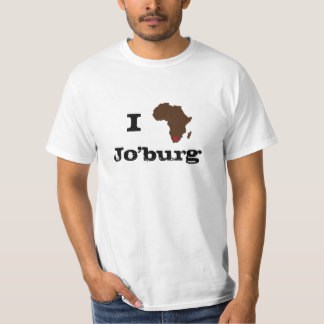
Current Government
We heard some very disinterested stories about the current president, which were corroborated from multiple people. He has never completed more than 5th grade, he cannot read or verbalize large numbers, he is corrupt and frequently places unqualified friends in critical cabinet positions. He has been charged with corruption, fraud and rape, among other things. He is a confirmed polygamist who has or had 11 wives, all of whom are supported by the state. He has over 20 children and more who are rumored to be his children with other prominent members of government. It’s enough to make your head spin. You think the US has problems with government. We have NOTHING over South Africa.
But So Much History
We saw gold mines, the Cradle of Mankind where some of the earliest human remains were found, the Apartheid museum, Nelson Mandala’s house he shared with Winnie, Desmond Tutu’s house where he has lived for many many years and where he currently lives, the Soweto area and the many markets set up to clothe and feed the people who live here. We saw a lot of malls and found some great new foods. There is plenty to do here and we could have stayed for months and still not done all the things that interested us.
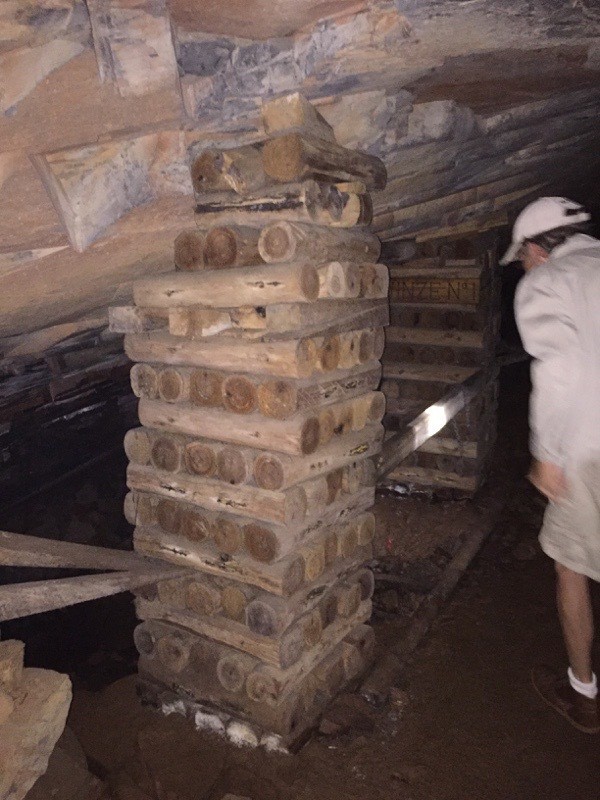
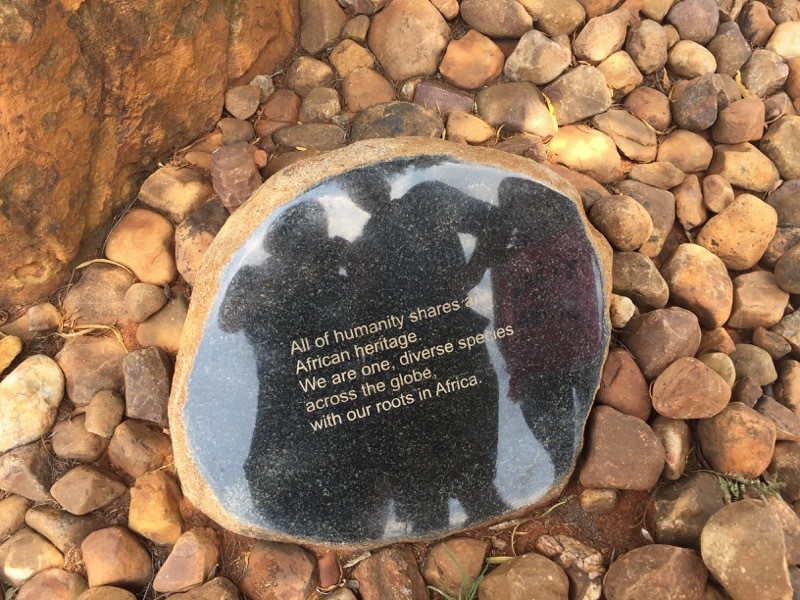
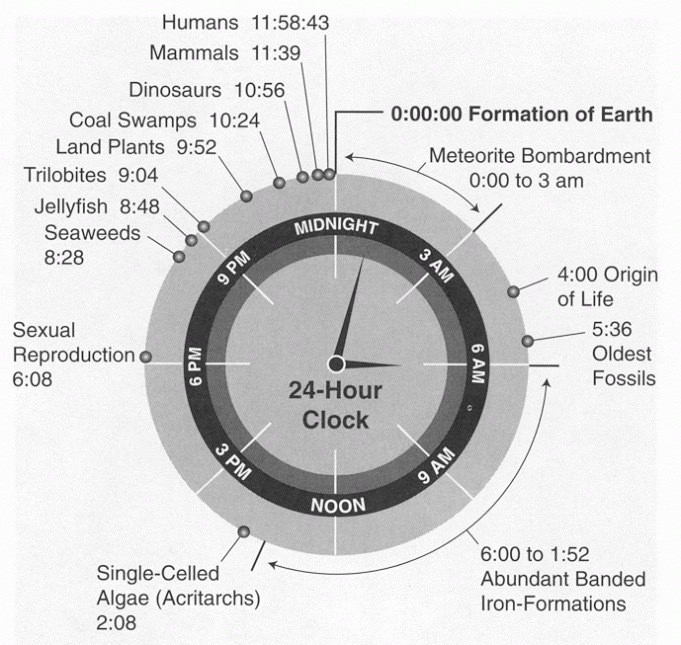
Bottom Line: Just Visit
It’s not the crime-ridden city of Detroit that the media makes it out to be. Yes, residents have their stories of being victims of crime, but not all. And evidently it’s a common topic at dinner parties (remind me not to go to those). But it’s also a lively, active, bustling city filled with hard working people trying to do the best they can with an incredibly complex set of problems. It makes the problems in the USA seems trivial and comical. South Africa’s challenges are breath taking, from a macro perspective. But from a micro perspective and despite all their problems, it’s a lovely place to visit. It’s got great weather, great food, good service, easy language (yay for English!) and most importantly, fascinating, unique and amazing people. Johannesburg has a certain urban grit that gives off a really interesting energy. I would imagine it’s similar to the love some people feel for New York City. You can’t deny the energy of millions of people who live there and just trying to make it work. Everyone we met was friendly despite this incredibly complex set of issues they face as a nation and city. Don’t believe the stories about how you should not stay in Joburg. Go, explore, meet people and enjoy it. We did.
